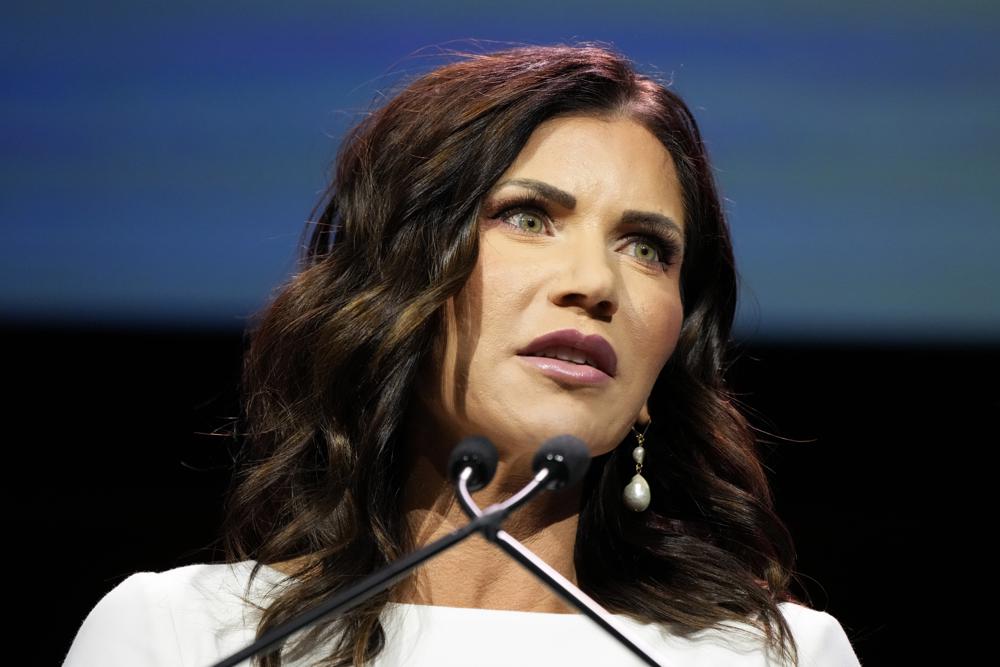
SIOUX FALLS, S.D. (AP) — South Dakota Gov. Kristi Noem laid out a plan Tuesday to spend an unprecedented amount of money in raises for state employees, teachers and health care providers, as well as boost infrastructure projects as the state receives billions in federal pandemic relief and sees surging tax revenue.
In a budget address to lawmakers, the Republican governor blamed President Joe Biden for recent surges in inflation, yet also reasoned that it made no sense to turn down the billions of dollars the federal government has sent to the state. With better-than-expected tax revenues, the governor recommended a 6% increase in funding for state employees, teachers and community government-funded medical providers — a massive leap for an allocation that has perennially been a budget squeeze in the Capitol.
“They’re suffering under the strain of horrifically high inflation stemming from the administration in Washington DC’s policies,” Noem said.
The governor sought credit for the state’s big tax revenues, saying it was due to her hands-off approach to restrictions during the coronavirus pandemic and claiming that South Dakota has the nation’s “strongest economy.”
The state’s economy certainly has weathered the pandemic better than most other states, marking a small economic dip as well as the highest personal income growth rate during the last two years, according to Pew Charitable Trusts.
But recently, growth in the state’s gross domestic product — a broad measure of the economy — has cooled off and slowed behind the nationwide rate. The governor’s own budget proposal was based on a forecast that assumes South Dakota’s GDP growth will lag the nation.
Democratic Sen. Reynold Nesiba said the biggest driver of the state’s economic success was the nearly $12 billion that the federal government has given to state government, businesses, organizations and individuals during the pandemic.
“Today’s speech was sponsored by the Biden administration” he said, adding that he would have liked to see more gratitude from the governor rather than criticism.
While the governor acknowledged that the state had received “a giant handout from Washington, D.C.,” she struck a distinctly conservative tone as she laid out plans to spend it.
“We are going to put these funds to work for our state to address our state’s most pressing needs — to make fiscally responsible decisions, one-time expenditures that will not grow the government but will instead save our people money in the long run,” she said.
She recommended saving 14% of budget reserves, then proposed projects totaling over $1 billion, including funds for housing, emergency responders, daycare facilities and water infrastructure. The governor detailed several projects, including a $70 million public health lab, $30 million cybersecurity training center at Dakota State University, a $35 million tourism marketing campaign and the start of a $600 million effort to overhaul the state’s prisons.
The chair of the Appropriations Committee, Republican Sen. Jean Hunhoff, stressed that the governor’s address would kick off the budget debate for lawmakers. She expected lawmakers to chip in with their own ideas for one-time projects, as well as take a close look at the 6% increase for teachers, state employees and health care providers.
Hunhoff warned that conservatives were wary of large ongoing expenses, saying that the state faced a “fiscal cliff when the federal dollars go away.” However, Nesiba promised to press for an even larger increase in salaries as he noted that South Dakota ranks among the worst in the nation for teacher pay.
“It’s a starting point,” Hunhoff said.
The final budget will be ironed out by the Legislature, which will convene in January.
